Bass CDs
New Album: Mulberry Street Symphony, With Bassist Scott Colley
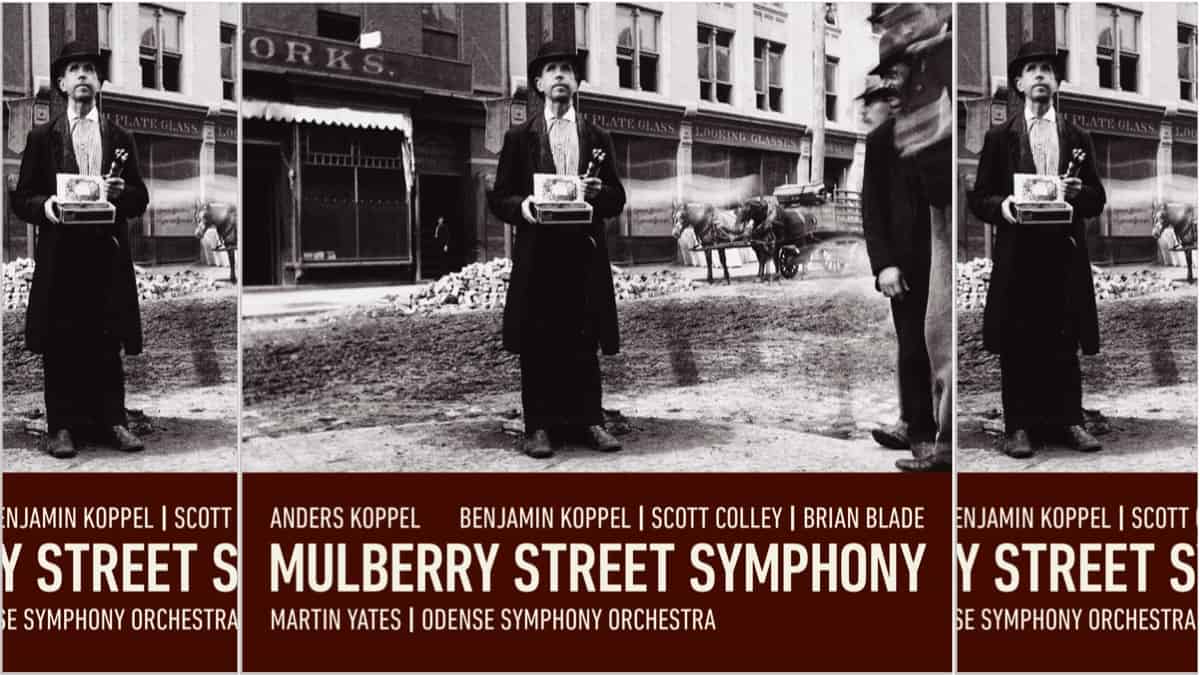
Mulberry Street Symphony…
Prolific Danish composer Anders Koppel, whose distinguished career includes music for theatre, film, ballet and over 150 scores for various classical ensembles, pays homage to his fellow countryman, the famed photographer and social reformer Jacob Riis, on Mulberry Street Symphony. Riis, who emigrated from his native Denmark to America in 1870, exposed the poor living conditions of impoverished immigrants in his groundbreaking photojournalism book, “How the Other Half Lives.” Inspired by Riis’ compelling photographs, Koppel created Mulberry Street Symphony, an epic work in seven movements, each one based on a different Riis photo depicting tenement life in New York City during the 1880s. “The work is a eulogy to the life and dreams of these people,” said the composer.
Koppel’s symphony for jazz trio and orchestra (the Odense Symphony Orchestra conducted by Martin Yates) showcases the composer’s son, alto saxophonist Benjamin Koppel, as the main voice through all seven movements. The work is underscored by the world-class rhythm tandem of bassist Scott Colley, whose sideman credits include work with Herbie Hancock, Jim Hall, Pat Metheny, Carmen McRae and Andrew Hill, and drumming great Brian Blade, a longtime member of the Wayne Shorter Quintet who has also toured and recorded with Bill Frisell, Herbie Hancock, Joni Mitchell and Bob Dylan. As Koppel noted of the flexible trio of Colley, Blade and his son Benjamin, “With their profound understanding of the music and their capacity for catching the moment, they melt effortlessly into the symphony orchestra and move the work to where the border between notation and improvising disappears.”
In capturing the essence of Riis’ striking photos in music, Koppel deftly integrates symphonic elements with jazz improvisation while also conjuring up a wide palette of colors and moods along the way. “The whole symphonic score is completely developed and notated, but I didn’t write that much for the trio,” he explained. “Great musicians have fantastic ears. And I wanted to take advantage of that by giving Brian, Scott and Benjamin the freedom that I knew that they could fill. And they interpreted my vision completely.”
Each of the seven movements of Mulberry Street Symphony is a dramatic piece that tells a story in sound. The cinematic opening track, “Stranded in the City,” conveys the sights and sensations of an immigrant’s arrival into New York City during the latter part of the 19th century. Benjamin Koppel commented on his father’s gift for capturing the extra-musical in his scores. “The way that he uses his music to describe feelings and stories and emotions and even actions is more like an abstract painter would paint a feeling. And because we know him so well, we know his intentions and we can hear his stories and we can relate to it all the way. And so that made this collaboration very easy and open for us to just go into exploring mode.”
As the expansive “Stranded in the City” develops, Benjamin’s alto sax alternately darts and soars to convey its shifting moods, from pensive apprehension to giddy optimism. Anders described the newly-arrived immigrant in Riis’ photo this way: “He’s a 19-year old boy in his best, maybe only suit, stranded on a staircase, in the corner, outside closed doors, hoping for food and lodging. Something happened to his eye. The pulsating sounds of the big city resound from the streets. The wondering, curious and shy look of his eye tell a story of arrival, isolation and will to survive.”
Equally cinematic, while also deftly straddling the through-composed and improvisational divide, are the gentle lullaby “Minding the Baby” and the frantic 20-minute “Tommy the Shoeshine Boy,” the latter featuring facile, Bird-like flights by Benjamin throughout, along with some ecstatic blowing over the more turbulent sections. The poignant and moody tone poem “Blind Man” is meant to portray the lonely figure in Riis’ compelling photo. As Koppel noted: “Always standing on the same spot, leaning slightly agains the lamppost at the corner, peddling his rubber-tipped pencils. The darkness in his gaze, the dignity of his posture.” The composer added, “I tried to convey a special character, a man who is very much himself, apart from society, in a sense. But then again, the music took on its own way.”
A dramatic “The Last Mulberry” is trudging, blues-tinged requiem for the last mulberry tree in Little Italy. As Koppel wrote: “A blues for the tree and for the time closing in. Still blooming every spring, its leaves became more and more sparse. In the end it was cut down.” The conversational playing between Benjamin Koppel, Scott Colley and Brian Blade enlivens this track as the orchestra swirls around the interactive trio.
The unabashedly swinging “Bandit’s Roost” is perhaps the most dynamic and freewheeling track of the set. With Colley and Blade setting the kinetic pulse, Benjamin wails with rare abandon and authority over the top of this up-tempo burner. Koppel described the Riis photo that inspired the invigorating music: “Young Italian mobsters posing underneath their mothers’ laundry hanging out to dry. Fragments of a popular song echo between the walls while plans are being made and energies collected, ready to burst.”
Mulberry Street Symphony closes on a comforting note with the hopeful hymn, “The New House,” based on a 1894 Riis photo of a new home for orphans and homeless children that he helped build on a green hill in the countryside. As Koppel noted: “The simplicity of the hymn reflects the hope and knowledge that lies behind this photo: things will change – and it matters what you do.”
In the process of putting the music together for Mulberry Street Symphony, Koppel said, “I was inspired by
the Riis photos but my aim was not to make a sort of programmatic piece. The music has its freedom always, as it should have. The music often has its own will. So my point of departure was the photographs, but then the music sometimes sort of took over.”
The significance of Koppel, born into a musical family in Copenhagen in 1947, now honoring the legacy of the Danish-American immigrant Riis at a time of increasing debate over the growing wave of refugees and immigrants around the world was not lost on the Danish composer. “In my family’s history there are these two immigrant stories: Firstly, my grandparents coming to Denmark in the beginning of the 20th century as Jewish immigrants from Poland. At that time, Poland was occupied by Russia and there were always pogroms on the Jews, so they fled to Denmark and made a living there. And secondly, my parents and my sisters were refugees from Hitler during World War II. When Germany occupied Denmark in 1940, they fled to Sweden. So the idea of being an immigrant has always been very present in my thinking. And these days, in this time of history, the whole issue of refugees that have no home and immigrants desperately trying to come into other countries is ever present. It’s a mess and it’s a tragedy. So that was another line of thinking in this new work.”
The son of classical composer and pianist Herman D. Koppel, Anders Koppel was a child singer in the Copenhagen Boys Choir and studied piano with his sister and father from the age of five. He also played the recorder and later clarinet and made several television and concert appearances as a youngster, including the first performance of his father’s Variations in 1962 at age 15. He took up the Hammond organ in 1966 and the following year founded with his brother Thomas the legendary Danish rock group The Savage Rose. The band toured Europe extensively from 1967 to 1974 and even made a Stateside appearance in 1969 at the Newport Jazz Festival while also recording eight albums in studios located in London, New York, Los Angeles, Rome and Copenhagen. Koppel left the group in 1974 to make his first solo recordings, Valmuevejen with singer Otto Brandenburg, and Aftenlandet, a progressive instrumental album. In 1976 he cofounded with bassoonist-clarinetist Peter Bastian and percussionist Flemming Quist Møller the trendsetting world music trio Bazaar. The band played together for 37 years until 2013.
In the ‘80s and ‘90s, Koppel wrote music for 50 plays, eight modern large-scale ballets and more than 100 movies. Since 1997, he has devoted himself to composing for classical ensembles and has completed 150 scores to date — solo pieces, chamber music, orchestral and vocal works, an opera and 33 concertos for solo instrument with orchestra. His saxophonist son Benjamin has been a featured player in six of his concertos. Father and son have also been playing together in recent years in a highly interactive quartet setting with Colley and Blade.
In the process of composing Mulberry Street Symphony, Koppel said, “I thought about the relationships between America and my country, and all the fantastic music that has been brought to us from America that has in many ways changed our lives and inspired us endlessy. And then Jacob Riis ran through my mind because I knew his story. I had just seen an exhibition in Copenhagen of his photographs, which impressed me very deeply. And so there was another link between Denmark and America.”
As a fully-realized work seeking to bridge the worlds of classical and modern jazz, Anders Koppel’s Mulberry Street Symphony is in the lineage of such successful orchestral works as Duke Ellington’s Black, Brown & Beige (1943), Miles Davis-Gil Evans’ Sketches of Spain (1960), Stan Getz’s Focus (1961) and the Claus Ogerman-Michael Brecker collaboration on Cityscape (1982). And like many of his past works, it brings together Koppel’s love of symphonic music and jazz improvisation in organic fashion. “I think that has been my language ever since I started writing scores,” he said. “I believe that the musical language that you have as a composer is a result of the life you have lived and the music you have studied and loved. My music has traces of all the music that I have been occupied with in my fairly long life —
classical, jazz, Cuban music, Italian folk songs, Turkish music. There’s so much fantastic music that influenced me during my life and all of that is in the music too. It’s all combined in my language, I believe.”
Added Benjamin Koppel, “I think all his music is very much his own music. He has his totally own voice and his own direction, which is this borderland between classical and jazz or rhythmical music. And because he was a performer himself, he has always been able to write music that all the members of the symphony orchestra love to play. He was a clarinet wunderkind when he was a child and performed of a lot of my grandfather’s clarinet pieces when he was 10, 12, 14 years old. So he knows what it’s like to be a wind player, but he’s also an extraordinary Hammond organ player and pianist as well. So he knows the instruments and he knows the importance of having fun while playing but also being challenged by the music. So he makes sure that every voice in the symphony orchestra is swinging and melodic and important. That is very much a part of his sound and his personal approach. And I think that’s a line going through all this orchestral works.”
Mulberry Street Symphony is scheduled to be released on February 18, 2022 via Unit Records.
Bass CDs
Reissue: Geddy Lee’s My Favourite Headache and Alex Lifeson’s Victor
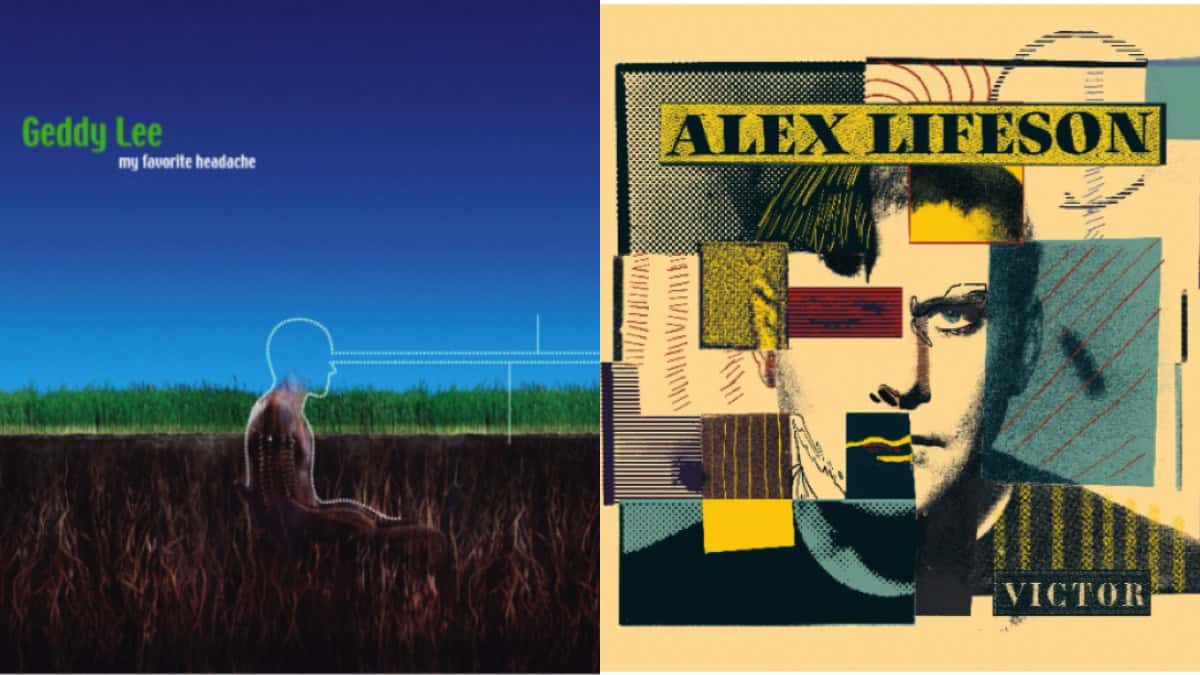
In an exciting announcement for Rush fans and rock enthusiasts alike, Anthem Records in Canada and Rhino Records will reissue the first-ever solo albums of Alex Lifeson and Geddy Lee. Lifeson’s 1996 album Victor and Lee’s 2000 offering My Favourite Headache will be re-released on August 9, 2024, in various formats, including a range of vinyl configurations.
My Favourite Headache, Geddy Lee’s only solo album to date, was initially released on November 14, 2000. This reissue marks its first vinyl pressing since a limited-edition Record Store Day exclusive in 2019. The fourth side of the album features two instrumental mixes. Produced by Lee, Ben Mink, and David Leonard, the album includes contributions from Mink and drummers Matt Cameron (Soundgarden/Pearl Jam) and Jeremy Taggart (Our Lady Peace).
Victor, originally released on January 9, 1996, marks Alex Lifeson’s solo debut. Lifeson took on the roles of songwriter, producer, and mixer for this album. For the first time, Victor will be available on vinyl, featuring a complete remix by Lifeson himself to enhance the audio quality. The fourth side of the album includes four instrumental tracks previously exclusive to Lifeson’s website. Guest artists include lead vocalist Edwin from I Mother Earth, Primus bassist Les Claypool, and Canadian powerhouse vocalist Lisa Dalbello. The 15-song collection is paired with striking 2024 reimagined artwork by Fantoons Animation Studios.
For more details on the Geddy Lee reissue and to preorder, https://lnk.to/MyFavouriteHeadache
For more details on the Alex Lifeson reissue and to preorder, https://lnk.to/AlexLifesonVictor
Bass CDs
New Album: Ben Wolfe, The Understated
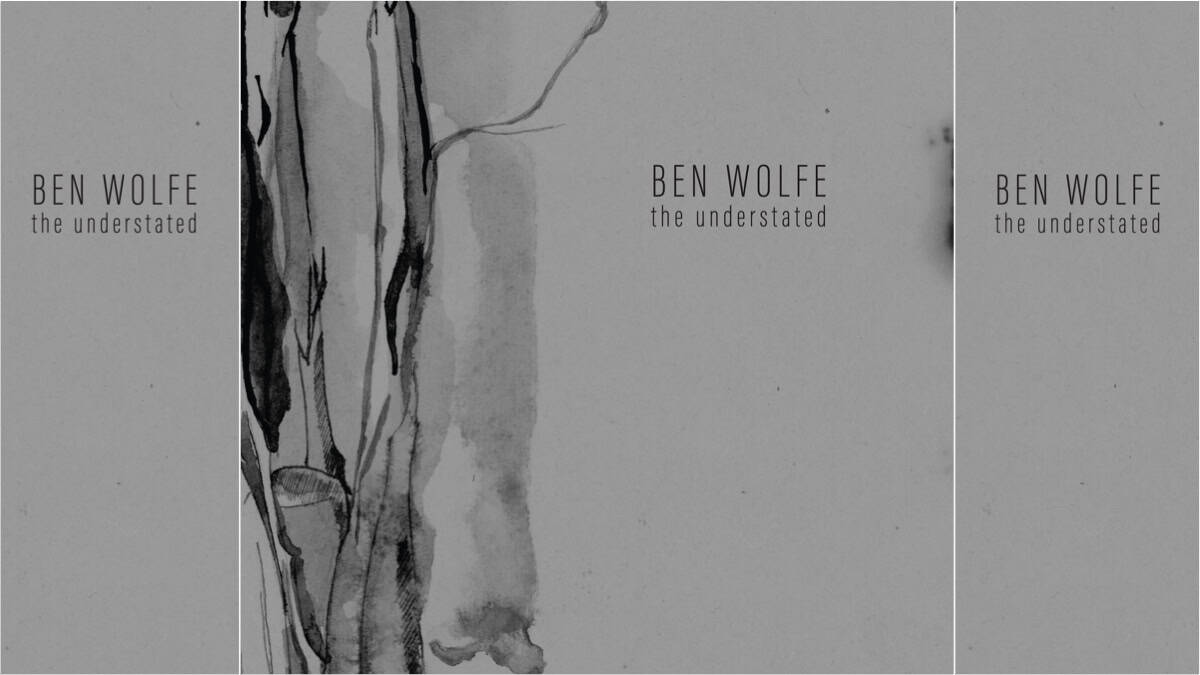
Acclaimed bassist and composer Ben Wolfe is thrilled to announce the August 9, 2024 release of The Understated.
This evocative new album features a collection of new original compositions by Wolfe paired, with re-imaginings of some of the composer’s classic material, with a particular emphasis on the ballad song-form. The album features ten tracks, five of which are ballads – a bold move for any composer – Wolfe creates a cohesive narrative here that challenges the listeners perception of the classic ballad. The Understated features Wolfe alongside artists who make up the very frontline of modern jazz, including pianist Orrin Evans, tenor saxophonist Nicole Glover, drummer Aaron Kimmel, guitarist Russell Malone and pianist Sullivan Fortner.
Wolfe has always been drawn to finding beauty in subtlety. He perceives a certain tranquility and elegance in the Coltrane Quartet, Louis Armstrong’s Hot Fives and Sevens, the legendary Miles Davis bands and rhythm sections, and the music of Charlie Parker. While he, of course, revels at the immense world-building energy of this music, it’s the “other side” – the elusive, magical aspect that endlessly captivates him – the understated. The composer draws inspiration most from the ensemble work of these hallmark jazz ensembles. Despite the individual parts being extraordinarily beautiful on their own, the musicians in these archetypal ensembles play only what is needed to serve the music, paying particular attention to the band-sound more-so than their individual sound. The Understated embodies this ethos with a tremendously impactful ensemble-oriented approach.
Wolfe sought to continue the thread started by “Lullaby in D” from his previous critically acclaimed release Unjust. Wolfe indicates, “Something about that take was so perfect to me. It had been brought to life, and it had that ensemble thing.” Wolfe assembled the quartet who recorded “Lullaby” (including longtime collaborator Orrin Evans, as well as recent frequent collaborators Aaron Kimmel and Nicole Glover) and two very special guests, Russell Malone and Sullivan Fortner. The recording process took place in one room with no headphones or isolation booths, further emphasizing the group’s collective awareness.
This record succeeds in bringing Wolfe’s expansive music to life through extremely conscientious group playing. Nothing is forced or pushed; everything that needs to be stated is stated. The single from the album, “Waltz,” encapsulates the spirit of the project. Wolfe says, “I view albums like a complete painting, so singles have been difficult for me. This song is very much in the spirit of the whole but doesn’t give away the record.” The piece features a sentimental melody delivered with grace by tenor saxophonist Nicole Glover, before Glover and Evans embark on stirring solos dancing in and out of the tune’s harmony.
Other new original compositions featured here include “Ballad in B”, which perhaps best demonstrates the group’s stunning cohesion. This tune is a refreshing diversion as it features a serene repeated melody without overt melodic improvisation. The following track, “Anagram”, begins with Kimmel’s rhythmic refrains and a unison melody played by Glover and Wolfe and is a true ensemble piece. On this track, Wolfe shines with a lyrical solo. The moody short interlude “So Indeed” is a lyrical masterwork that leaves the listener wanting even more. “Beautiful You” features master guitarist Russell Malone on the track’s melody. The emphasis here on restrained lyricism is a prime reminder of the old adage “it’s not the notes you play, it’s the notes you don’t play”. Each pocket of space in between melodic moments leaves room for the listener to breathe deeper and deeper into the song. The driving “Triangle Man” features fantastic improvisation from Glover and Kimmel. The tender “Barely Spoken” concludes the album with a feature for pianist Sullivan Fortner.
The album also weaves in references to Wolfe’s past works, creating a personal musical universe. “The Poet Speaks” is the opening track on his first record, 13 Sketches. “Occam’s Razor” was composed years ago for a collaboration with a choreographer and painter, and was a much different composition in its original form. “Love Is Near” was originally found on The Whisperer. With ballads in particular, Ben uses voicings and sounds that represent certain things to him, intentionally referencing his other compositions to generate connections between his songs.
Wolfe’s tremendous compositions on this album are also influenced by the group of musicians that he assembled for this release. Wolfe remarks “One of the things these five musicians share in common is that not only are they true ensemble players, they will always play something unexpected and special.” Listeners will find calm and beauty within the ensemble performances throughout The Understated.
Visit online at benwolfe.com/
Bass CDs
New Album: Orlando le Fleming, Wandering Talk
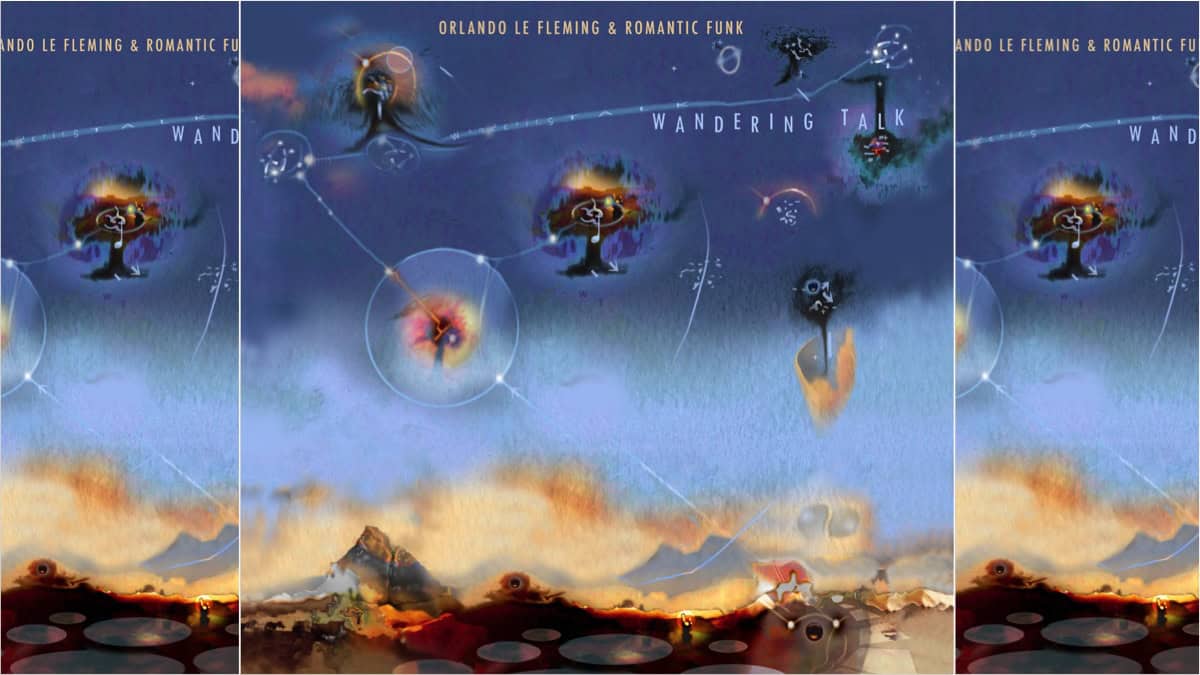
Bassist, band leader, and composer Orlando le Fleming continues to make music that crosses genres as readily as he crosses the Atlantic, with this new album ‘Wandering Talk’, to be released physically on 23rd August via the UK’s premiere jazz label, Whirlwind Recordings.
After 20 years in New York City, he’s back in his native UK, forging new pathways and renewing old partnerships. His love for the acoustic tradition continues unabated alongside his deep affection for the robust, muscular electric fusion that emerged in the 1980s, and he has received critical acclaim from media including The Guardian, Financial Times, Jazzwise, and All About Jazz among others. He has also toured and recorded with some of the world’s greatest jazz musicians including Branford Marsalis, Kurt Rosenwinkel, Antonio Sanchez, Ari Hoenig, and Wayne Krantz.
The Romantic Funk project was born in New York’s legendary 55 Bar to explore that legacy: now the new album ‘Wandering Talk’ builds on the critical acclaim generated by ‘The Unfamiliar’ (2020), building on the framework with a set of collaborators that brings together London and New York, past and present, acoustic, and electric, and merges it all into a spectacular whole.
Following the same principles that served the project in NYC, le Fleming booked four Friday nights at London’s renowned Vortex Club to workshop the music that would become the album, with a rotating cast of players which he honed down into the final line-up. Old London friends Tom Cawley (piano/keys) and James Maddren (drums) completed the rhythm section. New acquaintance Nathaniel Facey was picked from the ranks of the UK’s brightest young saxophone players. NYC stalwart Philip Dizack flew in from the US to play trumpet and reaching back to Orlando’s school days and forward to his own family, one-time classmate Chris Martin (Coldplay) and his own daughter Nadia combined to provide vocals on a special setting of Rumi’s poetry.
As before, the music combines fusion’s flash and fire with a contemporary sensibility. This time, Orlando’s questing spirit sends his superb band forward to investigate fresh areas of creativity in dynamic and texture.
Visit online at orlandolefleming.com
Bass CDs
Album: John Entwistle, Rarities Oxhumed – Volume Two
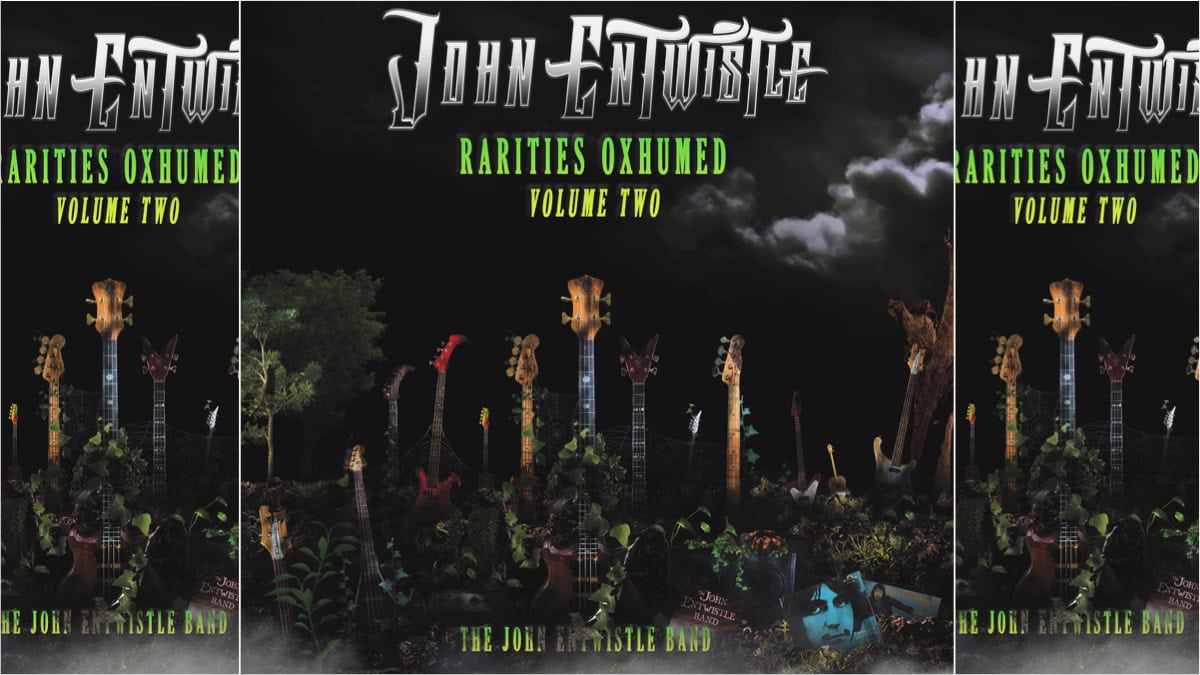
Album: John Entwistle, Rarities Oxhumed – Volume Two
Rarities Oxhumed – Volume Two is the second of the series of posthumous releases coming from John Entwistle.
Rarities Oxhumed – Volume Two is a compilation that was curated by drummer Steve Luongo, who served as John Entwistle’s producer, bandmate, business partner and good friend for many years. As Luongo states, “When I agreed to do two volumes of John Entwistle rarities, I knew volume two had to be even better than volume one. It is!” The collection of songs on Volume Two are from his years with the John Entwistle Band and include re-mastered versions of studio tracks including “Endless Vacation”, alternate mixes of tracks like “Sometimes”, and live tracks including The Who cuts “Real Me”, “Long Live Rock” and an epic version of “Young Man Blues”. The latest preview track to be released is the Who cut “Had Enough.”
Listen to “Had Enough” here: push.fm/ps/hadenough
Rarities Oxhumed – Volume One was quickly embraced by longtime fans as it featured gems like “Bogey Man” featuring Keith Moon, “Where You Going Now” (demo for the Who), and a raw live version of “Trick of the Light” recorded during the John Entwistle Band’s final tour in 2001. Deko Entertainment is thrilled to have been able to bring both volumes of this unearthed music of John Entwistle to the fans and forever solidify him as one of the greatest rock musicians ever.
For more information, visit online at dekoentertainment.com/john-entwistle
Bass CDs
Album Review: Mark Egan, Cross Currents
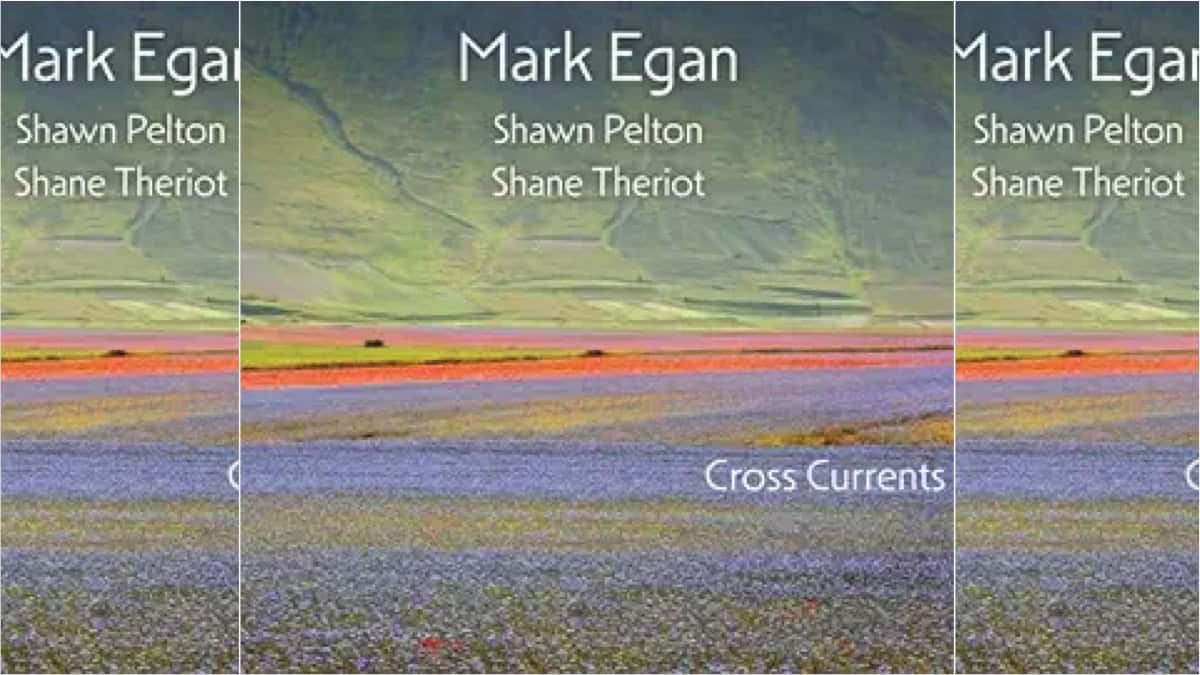
Mark Egan, Cross Currents…
It is exciting every time I get a new album from Mark Egan as he is such an amazingly versatile player and I never know what to expect (except for excellent artistry!) In his latest release, Mark has teamed up with Shawn Peyton on drums and Shane Theriot on guitar to bring us “Cross Currents”.
This collection of eleven tracks transports me to the Gulf Coast (New Orleans specifically). Mark’s fretless basses lay down a solid groove and lots of juicy solo work for this rootsy collection of funk, ambient, swamp-rock, second line, ballads, Cajun and even Indian Raga.
This trio is super-tight and the musicianship is flawless as each member has ample opportunity to shine. Even though each player is very talented in their own right, I feel that the collective energy is greater than just the sum of the players on this album. Each musician contributed to composing music for this project but the lion’s share are Mark’s original pieces.
I spent the summer of 1981 in New Orleans and this wonderful music takes me back to those fond memories. I participated in a wacky raft race on Lake Ponchatrain and this opening track elicits images of fun, sunshine, music, and great food.
This is another superb album that everyone will enjoy. Get your copy today! Cross Currents is available online at Amazon.com. Visit Mark online at markegan.com.











